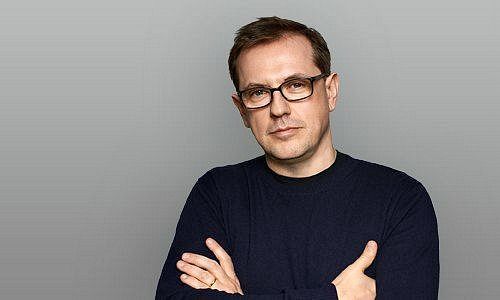Martin Saidler: «Of Course Failure Scares Me»
Martin Saidler has snapped up more investors for his firm Centralway Numbrs than Switzerland's budding fintech scene combined. He speaks to finews.asia about his platform and the fear of failing.
Mr. Saidler, your fintech, Centralway Numbrs, is supposedly worth $1 billion – a unicorn. Is that true?
The last valuation that we published was in the press release announcing the Investment Corporation of Dubai's stake...
...in which valuation was put at a high three-digit million sum.
We can't and don't want to participate in this particular discussion beyond that.
Your most recent investor was the Investment Corporation of Dubai, the ICD – your first institutional investor. This lifted your invested capital to $125 million. How high is your own stake in Centralway Numbrs now?
I still hold nearly 70 percent of the company's stock. This gives us freedom in further developing the firm. Currently, we have 46 private investors and ICD as our only institutional one.
You have several very prominent investors: Marcel Ospel, Josef Ackermann, Pierre Mirabaud's family and Sir Ronald Cohen...
It would be false to think that our banking app only has investors with ties to finance. We also have investors from the machinery industry, technology, and entrepreneurs and families mainly from Europe, but also from Israel.
With risk capital, it's common that investors put in money in tranches linked to reaching performance targets. What's your agreement with ICD?
As an investor in the past, I would always link my financing commitments to reaching certain milestones. It's different with Centralway Numbrs: investors pay the agreed sum, and receive stock in return.
Centralway Numbrs isn't generating any turnover yet, so what is your negotiating proposition?
You can make lots of mistakes as a start-up entrepreneur. In the end, you may be sitting on a diluted 5 percent of 10 percent share and become a pawn of certain interests, are pressured into making decisions by investors or into an exit. I wanted to avoid all that.
«Centralway Numbrs doesn't run on air»
I financed everything in the beginning, and took my first presentable results to potential investors with whom I had done business in the past – so we already had a basis of trust. We negotiated for more than ten months last year with ICD. We had to show certain incremental results, which we managed to do. We had other offers on the table, but ultimately decided for ICD because they maintain a very long-term investment perspective.
There's always the risk that investors offer you less money in future financing rounds, arguing that the company's value doesn't warrant more. How do you gauge the risk of this happening to Centralway Numbrs?
Of course we're not entirely shielded from swings in value, but Centralway Numbrs doesn't run on air. We have a technologically very mature platform. In Zurich, a highly-qualified team of software engineers is working for us. We've also matured in four years as a firm. Another factor is that I have invested in every financing round except for the ICD one – that establishes trust.
You have taken in more money than the entire Swiss fintech scene combined. With that comes enormous expectations. How do you deal with that pressure?
An investor has to understand what we're dealing with here: risk capital. That's an asset class where investors can expect a high return in the best case, but will lose it in the worst case. Our investors know that. We also have contractual agreements stating this.
«We already manage more accounts than a mid-sized universal bank»
I feel pressure as an entrepreneur and an employer: there are 150 people from all over the world who have come here to work and help this company succeed.
You're burning a lot of money, have a very high valuation, and no revenue so far.
We've built a technologically very sophisticated platform in the last four years and also built up a considerable user base. Look at a few of our numbers: the Numbrs app manages 1.5 million bank accounts so far. That's more than a mid-sized universal bank. Until now, we're only present in Germany, but we plan to begin in the UK soon and in other markets. It costs banks roughly 300 euros to acquire a new client. I can assure you that it costs us far less. Our costs and our valuation are based in economic logic.
You don't disclose the numbers of users your app has. Why not?
We have several hundred thousand active users, but you're right in that we don't disclose more specific information right now. It's not about being secretive; it's completely normal – we do have competitors after all.
In your business model, banks earn a commission for products bought within the app. Your margin must be quite small. That means you have to ramp up volume with millions more users.
Of course we're still in a very early stage, but what we've built up in the last few years is an eminently scalable supermarket for banking products. Recently, we won Postbank and Norisbank as partners and offer credit cards, loans, and banking accounts. Not just that:
We can offer every kind of banking and insurance product on the Centralway Numbrs app, be it in Germany, the UK, the U.S., or the Middle East. To say it in images, we've only just begun stocking the shelves of our supermarket.
There are countless banking and personal finance apps competing against you. Why should people user Centralway Numbrs?
Our user interface may look like just another banking app. What Centralway Numbrs offers is what we call «cloud banking». Users can access a range of products and services from this cloud. At the same time, we give our users the possibility to optimize his or her current banking relationship, budget and return targets.
«It's like Coop or Migros, where a customer can buy Coke or Pepsi»
A user might for example receive a message that here is an opportunity to refinance his or her loan at better terms. An algorithm calculates your bank account's development based on your data and makes suggestions for improving it. This type of functionality is a competitive advantage versus other apps.
How can users be sure that Centralway Numbrs isn't going to push a certain bank's products over others?
Our claim is to offer our clients products and services that fit their individual needs and financial situation the best based on an intelligent data analysis. We are the same as any vendor and stock our shelves with products that offer the best value at the most favorable price. It's like at Coop or Migros, where customers can choose between Coca-Cola or Pepsi. We don't offer banks any exclusivity. The offering has to meet the needs of our target group.
Those are retail clients. Are you considering a private banking offering?
No, we don't have any plans for that currently.
What's the further rollout look like? You're in a beta phase in the UK...
...we're starting shortly there. On the whole, we want to stock our store with products more rapidly and improve the app. As soon as we've achieved that in Germany and the UK, we'll start looking at other markets.
You're at an interface between clients and banks, which sets extremely high requirements on data security.
Data security is one of the biggest challenges of our increasingly digital world. A considerable portion of our total spending goes toward this, and we do a lot in this area. I personally am invested in several firms specialized in cybersecurity, so there's a certain know-how benefit there.
Are you aiming to take Centralway Numbrs public?
Our investors have put in money in order to generate return, so clearly we'll seek an exit at some point. It's still completely open how this exit might look and when it could happen. Personally, I want to keep a majority stake.
You do a lot of things differently than other Swiss fintechs. You are using massive resources from investors to build up a platform, and monetization is secondary. That sounds more like U.S. methods, where here it's more typical to find investors after you've generated some turnover.
That's true – we're pursuing an approach that is more U.S.-based, if you will. It's incredibly difficult to do that in Europe and Switzerland. The venture capital culture here is very different than that of the U.S. or China too.
«What Switzerland doesn't need is a fourth of fifth interest group for fintechs»
That's another reason why I personally put a lot of capital into building the company, and have been hesitant about communicating to the wider world.
Domestic start-ups view you with mistrust because your project is far weightier by investment, but you don't generate revenue yet. Do you feel misunderstood?
No, I've been doing this too long to feel that way. The fact is that we've built up a Swiss technology firm with 150 highly-qualified employees to develop a global banking platform. That may not correlate with domestic proportions.
What has to change in Swiss fintech?
What Switzerland certainly doesn't need is a fourth or fifth interest group. The lighter regulation from Finma that the Swiss government is introducing also does little to change structural issues. First, you need a culture of risk and of risk capital investing.
What does that mean specifically?
Softbank, the Japanese technology and media firm, just launched a tech fund to investo $100 billion. That's the proportion that the domestic sector needs to look at. We need alternatives.
Such as?
An alternative could be for example that Switzerland develops a culture of failure. I know countless innovative start-up entrepreneurs who don't speak publicly because they could be portrayed as «failed» later. That's sad.
Are you afraid of failure?
Of course I am. If I wasn't I'd have to dismiss myself. Fear and failure are part of this business, but I don't want to complain about it. You have to understand: no stone will be left unturned by this process of digitization. This will be a long-term process, not an immediate one.
You want to be at the forefront of this process. What inspires you?
I don't have anything in common with the founder of Apple, Steve Jobs, if you're suggesting. I've been accused of imitating him with my dark suits and sweaters. What inspires me is the possibilities of technology and digitization – that fascinates me.
Martin Saidler is CEO and founder of Zurich-based Centralway Numbrs. The native Austrian is a web entrepreneur and investor who was instrumental in developing the Scout24 group. After selling his stake in that firm, he invested in Internet start-ups in eastern Europe. The firm Centralway has developed into an incubator, from which Centralway Numbrs has emerged. Saidler has taken on Swiss citizenship and lives with his family in Zug.




























